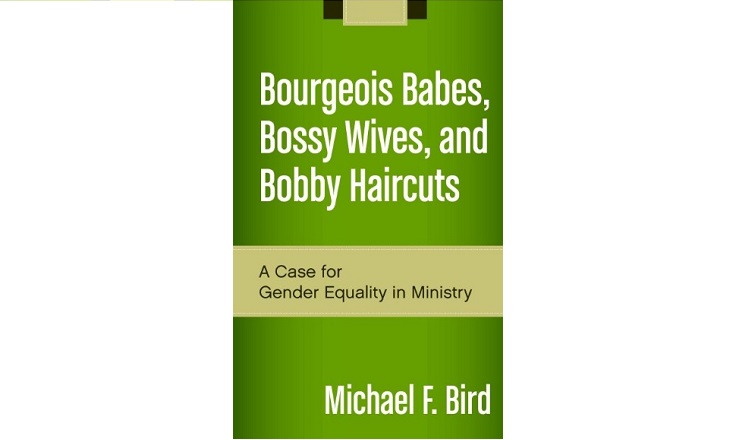The apostle Paul says, “I do not permit a woman to teach or to exercise authority over a man; rather, she is to remain quiet.” (1 Tim 2.12)
Until reading this book I wouldn’t have guessed that Michael Bird supported women preaching sermons in church. Guess that shows my ignorance of the topic.
- Link: Amazon
- Length: 64
- Difficulty: Medium-Easy
- Topic: Topical, Women, Preaching
- Audience: Mainstream Christians
- Published: 2012
Like some of his books I’ve read, it has his usual style of humor. Its engaging and informative. Otherwise, I found it a quick and easy read.
This book review is one of three in which I did some reading on the arguments surrounding women giving sermons. The other reviews are:
- Dickson, Hearing Her Voice A Case for Women Giving Sermons (Link), and
- Bolt, Payne, Women Sermons and the Bible (Link).
This post is one of my book reviews.
Contents
- Introduction
- 1. Who’s Who in the Zoo?
- 2. Fretting over Phoebe
- 3. Women in the Pauline Churches
- Heads, Hair, and Hats Women and Silence
- Mutual Submission
- Paul’s Cohort of Female Coworkers
- The Egalitarian Manifesto
- “I Do Not Permit a Woman to Teach”… But Why?
- Conclusion
- Epilogue: Who Is Ilse Fredrichsdorff?
Main points
Introduction
8 For man was not made from woman, but woman from man. 9 Neither was man created for woman, but woman for man. (1 Cor 11.8)
Bird shares that in his early Christian life he believed what he learned in church, that women giving sermons was wrong. But after reading the scriptures with this issue in mind, listening to knowledgeable speakers on the topic and being exposed to the behaviour of some in the complementation camp he changed his mind.
He explains the interpretative problems he faced about 1 Tim 2.12 and 1 Cor 11.2-16 was that they both employ theological arguments from creation. Bird could not bring himself to believe Paul’s command that women prophesy with their heads covered was universal because of the argument from creation. This undermined his thinking that it should hold weight for 1 Tim 2.12-14 as well.
Who’s Who in the Zoo?
In this chapter, Bird gives a very helpful range of egalitarian and complementarian positions along a spectrum. Bird tables the spectrum and gives a brief explanation of each. Moving from left to right the categories are:
| Christian Feminist | Evangelical Egalitarian | Moderate Complementarian | Hierarchical Complementarian |
I found this quite helpful because I realised that even Moderate Complementarians could be criticised by Hierarchical Complementarians for not being biblical just as the Egalitarians would be criticised by the Moderate Complementarians. Maybe if the moderates get to superior in dealing with the egalitarians then they should be criticised in turn by the hierarchical group?
Fretting over Phoebe
16 I commend to you our sister Phoebe, a servant of the church at Cenchreae, 2 that you may welcome her in the Lord in a way worthy of the saints, and help her in whatever she may need from you, for she has been a patron of many and of myself as well. (Rom 16.1-2)
After Paul dictated Romans to Tertius, he gave the finished letter to a woman named Phoebe. In all likelihood Phoebe read the letter aloud to the house churches in Rome and answered their questions if they had trouble understanding it.
Women in the Pauline Churches
7 Greet Andronicus and Junia, my kinsmen and my fellow prisoners. They are outstanding among [Gk. ἐν, Rendered ‘among’ as the most likely meaning] the apostles, and they were in Christ before me. (Rom 16.7)
In the next few sections Bird discusses 1 Cor 11.2-16; 1 Cor 14.33-36; Gal 3.26-29, and 1 Tim 2.11-15 in a little detail. He also brings a series of others as an aside.
I found his discussion on Junia the most interesting. Especially noting the early church father John Chrysostom didn’t seem to have a problem with a female apostle.
His discussion of 1 Tim 2.11-15 centered on the inconsistency of many in the complementarian camp who believe women should be prohibited from preaching in church. But are quite happy to allow women to teach men in a variety of other situations.
Bird evaluates what ‘to teach’ refers to in 1 Tim 2.12. For him it could refer to something positive or negative. Positive in the sense of giving Christian instruction. Negative in the sense of propagating heresy and domineering.
He decides in favour of the latter. Arguing Paul means to say, ‘I do not permit a woman by false teaching to dominate a man’. He believes that in the cultural context of Ephesus at the time, there were problems with women to this effect.
I respect Bird, but I felt he didn’t have enough evidence to support his view.
Conclusion
Bird sums up with his own stand on the debate. Sharing some brief thoughts and stories. Bird is quite passionate on the topic, yet he is still diplomatic. He finishes with an affirmation that egalitarians do hold to biblical authority and complementarians are not deliberate oppressors of women.
Recommendation
Clearly it’s a very small book, an essay really. I found it quite readable and humorous at times.
Bird errs on the side of egalitarianism. But he tries to find merit in both egalitarian and complementarian positions. Its an eirenic argument.
The best things about the book I found were understanding the potential spectrum of different positions and learning a little more of the women involved in Paul’s gospel ministry.
Copyright © Joshua Washington and thescripturesays, 2017. All Rights Reserved.





